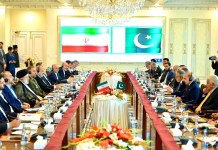Pakistan ended the long-standing visa-on-arrival facility for Afghan citizens in what many critics see as deteriorating relations between two nations. According to the Federal Investigation Agency’s (FIA) immigration wing, the move comes due to heightened security risks emanating from Afghanistan.
The US Will Not Pull-Out From “Mineral Rich” Afghanistan Worth Trillion of Dollars : US Analyst
Following the decision, the government also restricted the mobility of Afghan nationals in the country and halted visa issuance on airports and borders crossing points. FIA Immigration Director Ismatullah Junejo said Afghan nationals were being granted a 30-day visa on arrival at entry points. As the new policy comes into effect, they will be required to apply for a visa from Pakistani missions in Afghanistan.
Once issued a visa, the Afghan nationals will be allowed entry into Pakistan. Upon entry, they will be asked to fill out details including the time period and place of stay. The details, in Form C, will be forwarded to security agencies for verification. Once the details are verified, the Afghan nationals will be issued residence and travel permits.
Earlier, Afghan nationals holding Afghan passports, living in Pakistan were allowed visa extension for a period of six months with one re-entry allowed.
“Afghan origin/third country passports holders are initially granted 45-days visa by our missions abroad except Pakistan Mission in Afghanistan. They are allowed a further extension for 45-days,” reads the Directorate General of Immigration and Passports website.
A total of 24 countries were now given on-arrival visa facility. These include Australia, Canada, China, Denmark, Finland, France, Germany, Belgium, Greece, Iceland, Italy, Japan, Korea, Malaysia, Norway, New Zealand, United States, United Kingdom, Thailand, Spain and Singapore.
The move casts doubts over Prime Minister Imran Khan’s pledge to grant citizenship to around 1.5 million Afghan refugees who have resided in Pakistan for decades.
“Afghans whose children have been raised and born in Pakistan will be granted citizenship because this is the established practice in countries around the world,” the premier had said. “They are humans. How come we have deprived them and have not arranged for offering them a national identification card and passport for 30 years, 40 years?”
Pakistan has the largest refugee population in the world, according to the United Nations. The refugees mostly comprise of the 2.7 million Afghan nationals who fled their native country due to war, violence and ensuing economic turmoil. The UN surveys estimate that 60 per cent of the Afghan refugee population is Pakistan-born.
More News at EurAsian Times
- Indian Military Base in Vietnam To Protect Hanoi’s Territorial Interest
- Indian Military Base in Sabang can Strangle China at the Strait of Malacca
- Saudi Money, US Weapons, Israeli Intelligence Fuelling Arab NATO – Iran
- Will Ayni Airbase in Tajikistan Become India’s 1st Overseas Military Base?
- Indonesia Opens Another Military Base at Natuna Islands To Counter Aggressive China





